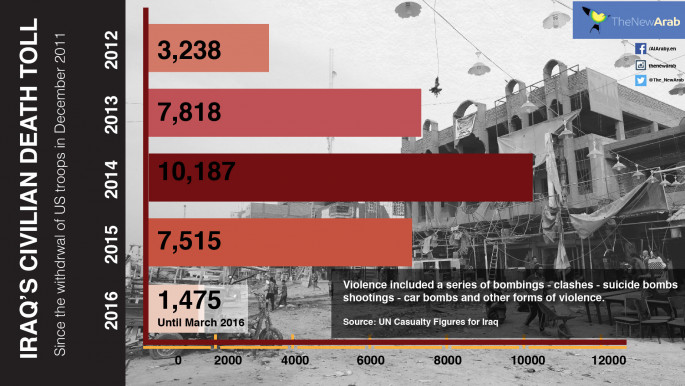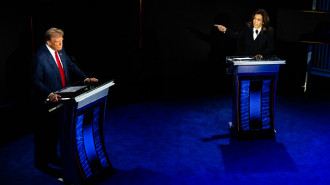Iraqi forces close to fully retaking IS-held Anbar town
The pro-government forces have advanced well inside the town after nearly two weeks of fighting, with reports of street battles erupting with the jihadists, according to military sources. The US-led coalition is providing air cover to Iraqi forces.
"Iraqi army forces and tribal fighters have pushed back Daesh dramatically today," Rajeh Issawi, member of the official security committee in Anbar province, told The New Arab, using an Arabic name for IS.
"The Iraqi forces captured a number of police stations, a courthouse and the Muallimeen district," Issawi added, saying IS militants are attempting to retreat via the nearby Euphrates into their strongholds in western Anbar.
Hit is a strategic town linking the provinces of Salah al-Din and Nineveh, and is an important hub leading to Jordan and Syria.
The fate of thousands of civilians trapped in the town is unclear, meanwhile, amid relentless aerial bombing and shelling.
Iraqi security forces in Anbar said they have estabished refugee camps to house civilians evacuated during the army's progress in the area, but multiple sources in Hit confirmed to The New Arab thousands have been trapped in the town for days.
Civilian casulaties as a result of airstrikes have been also reported by activists, who said coalition and Iraqi warplanes are sparing no part of the city.
"Iraqi forces are using a scorched earth policy against Daesh, who were also preventing civilians from leaving," said Mohammad al-Anbari, a local official in Hit. Anbari claimed the Iraqi media is deliberately ignoring civilian casualties in the town.
 |
The slow advance in Mosul has cast doubt on the capabilities of the Iraqi army |  |
Mosul battle on hold
Meanwhile, the Iraqi army's first phase of a campaign to recapture the northern city of Mosul from IS has been paused until more forces arrive to hold ground, the commander in charge told Reuters on Wednesday.
Almost three weeks into the operation, Iraqi forces have retaken just three villages from IS in the Makhmour area near Mosul.
The slow advance has cast doubt on the capabilities of the Iraqi army, which partially collapsed when IS militants took around a third of the country in 2014.
|
Maj. Gen. Najm Abdullah al-Jubbouri, who is in charge of the offensive, said that Iraqi forces were now waiting for the arrival of federal police units and additional local tribal fighters to hold territory after it is retaken.
On the same day, the Iraqi Shia-dominated Popular Mobilisation forces said they would join government forces preparing to fight IS for Mosul, despite objections by politicians who fear this could cause sectarian bloodshed in the mostly Sunni city.
"We think the battle to liberate Mosul will be huge, complex; it will be about guerrilla warfare in built-up areas, which only Popular Mobilisation fighters are good at ..., as forces may be fighting house to house, room to room," the spokesman, Jawad al-Talabawi, said in an interview on Wednesday in Baghdad.
Iraqi Parliament Speaker Salim al-Jabouri made a plea in March to keep the Shia militia out of Mosul.
Jabouri, a Sunni Muslim, said the Popular Mobilisation had carried out abuses against Sunnis in areas captured from IS, and barred people from returning to their homes.
To avoid atrocities, Jabouri said, the Mosul campaign should be led by Iraqi army troops backed by Sunni tribal fighters and US-led air strikes, along the lines of what happened in Ramadi.
Until Ramadi's recapture in December, it was the Popular Mobilisation, assisted by Iran, that led operations to recover territory from IS.
 |
| [Click to enlarge] |

![Palestinians mourned the victims of an Israeli strike on Deir al-Balah [Getty]](/sites/default/files/styles/image_684x385/public/2024-11/GettyImages-2182362043.jpg?h=199d8c1f&itok=xSHZFbmc)


![The law could be enforced against teachers without prior notice [Getty]](/sites/default/files/styles/image_684x385/public/2178740715.jpeg?h=a5f2f23a&itok=hnqrCS4x)
 Follow the Middle East's top stories in English at The New Arab on Google News
Follow the Middle East's top stories in English at The New Arab on Google News

![Voters in Michigan [Getty]](/sites/default/files/styles/image_330x185/public/2182490468.jpeg?h=a5f2f23a&itok=XMi_sWGX)
